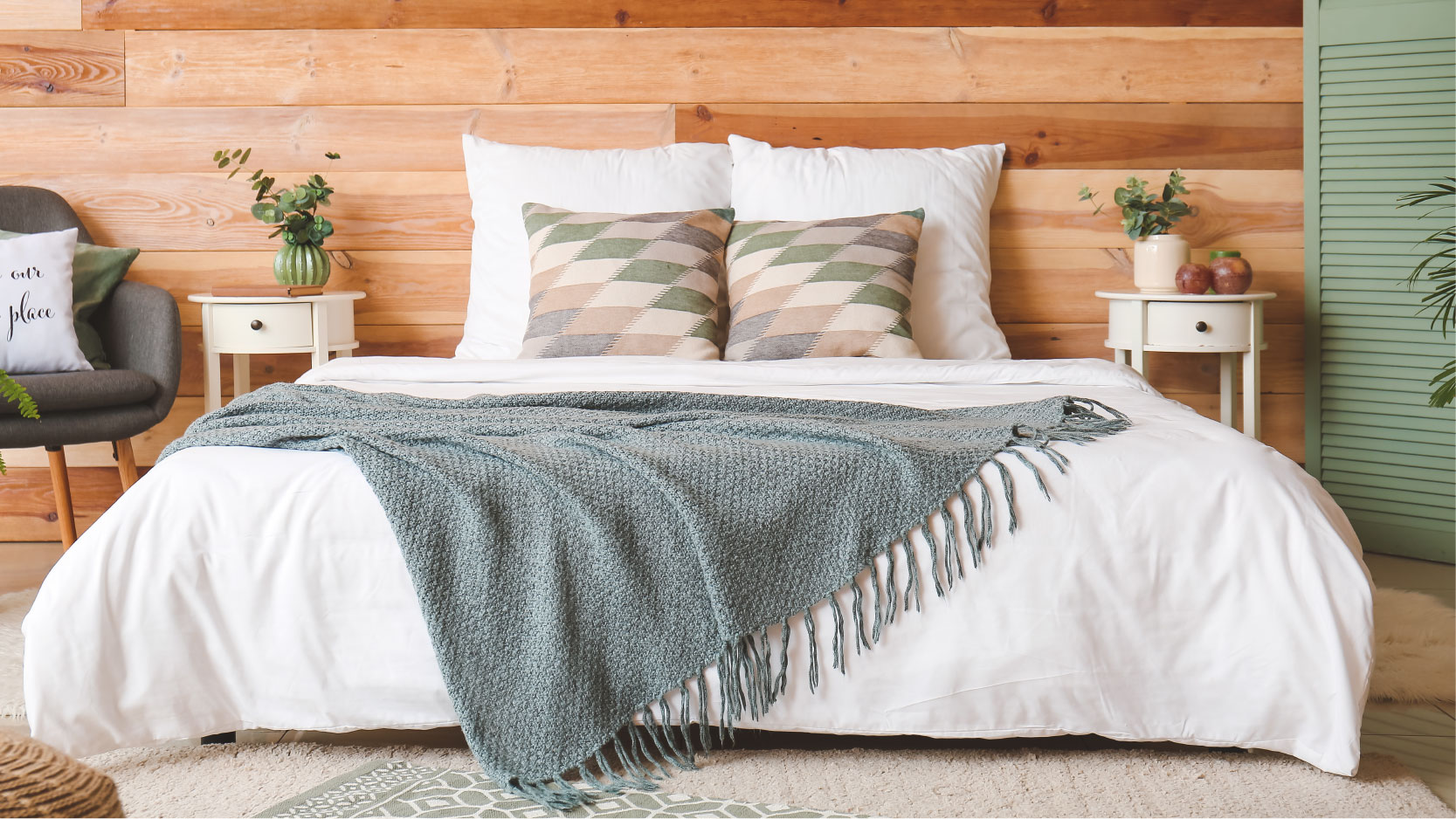Wanting to optimise your bedroom and create a true sleep oasis?
Cool, dark, restful, cosy and device-free are the key concepts to keep in mind when looking to design the ultimate bedroom environment.
Here are 6 top tips to enhance your sleeping space:
- Banish Clutter
A disorganised, messy or cluttered space can distract you from falling asleep or feeling relaxed. Spending just a few minutes a day decluttering and ensuring belongings have a proper “home” can positively impact your mindset and help to promote a restful environment.
Attempt to keep work-related items or bills and other papers in a separate office space or out of sight. Keep clothes in the cupboard or a laundry basket, dishes in the kitchen and rubbish in a bin. A bedside table, storage organiser or attractive containers and baskets can hold odds and ends, keep your space neat and also allow any essentials to remain within reach. Cupboards provide the space to keep clothes and necessary items out of the way.
- Create a Cool, Fresh Room
Research states that the ideal sleeping temperature of 18.3°C and the temperature of a cooler bedroom is vital in achieving good-quality slumber. We also associate fresh air with relaxation and a soothing environment. A drop in body temperature also tends to encourage tiredness, meaning better sleep is more likely.
Even in a room set to the ideal sleeping climate, you may still need to open your window to let fresh air circulate through your sleeping space. If you’re a light sleeper or disturbed by outside noises, you could keep the window shut and use a fan to keep the air circulating, but make sure it’s not pointing directly at your body since this could result in sore muscles and headaches.
- Ensure your Mattress is Comfortable
It’s generally recommended to replace your mattress every seven years, however, this really depends on the quality of your mattress. You should essentially look to replace this whenever the bed is no longer comfortable or feels as if it is lacking in support. Remember that changes in age, weight, and health can also change comfort needs, even if the mattress is still in decent shape.
If your mattress shows heavy impressions or causes sore joints or pain at pressure points, it may be past its prime or affecting the alignment of your spine. Generally, latex and memory foam mattresses will last longer than beds with springs, as springs tend to wear out faster than foams.
- Choose Colours Conducive to Sleep
Lighter, more neutral colours such as light blue, green, silver, grey, rose-pink and lavender are generally ideal hues for the bedroom. Cool colours such as these are considered stress relieving and have also proven to help lower blood pressure and the heart rate to help ensure a proper night’s sleep.
As a rule, it’s best for most of us to avoid painting bedroom walls a dark colour (look to use a matte paint finish as opposed to glossy because it keeps colours softer) or using very bright colours in our linen and décor choices.
- Keep Pillows Fresh
Pillows are very important to sleeping comfortably. Down alternative and poly-fill pillows may need to be replaced more frequently than latex, down, buckwheat, and memory foam pillows, which last a few more years with good care. Pillows and linen should be washed regularly to reduce bacteria and allergens that can make sleep less comfortable.
If a pillow feels too flat, too thick or no longer provides adequate cushioning and comfort, it can lead to neck pain, back pain, or pressure on muscles and joints. Back sleepers should probably select a thinner pillow with neck support in the lower third, side sleepers should go for a firmer pillow that supports the natural distance between the ear and shoulder, and stomach sleepers should either opt for no pillow or a very thin one.
- Check your Furniture Arrangement
Certain furniture arrangements, particularly the placement of your bed, may lead to better sleep. Placing your bed against the wall makes perfect sense and it is recommended not to set the bed against the same wall as the door. Every time the door opens or closes, you are likely to be alerted and want to investigate.
It is also best to avoid placing your bed under a beam or low ceiling, as your instincts may remain switched on and keep you awake. Also, avoid any large hanging light fittings above your bed for the same reason. Ideally, all activities related to your job or work should remain out of the bedroom because these may affect your mind and cause you to subconsciously think about work.












